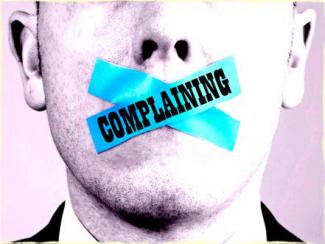We all have one (or more) friend(s) that seems to complain all the time. It can be about little, things, big things, every things. One of my ugh moments is when THAT friend complains about how much another friend complains. It's comical, yet taxing on the soul. To listen to all of that over and over again just wears a person down. Then it becomes, do I not hang out with that friend as much? Do I remain friends on Facebook, but unfollow them so I don't see his negative posts every day?
My father and I don't have the best relationship and never did. Since I came out, it actually has been better than the "before I was gay" years. One of my biggest issues with my father is that he complains about things he has no control over. He had just had his prostate removed and we were driving back home from Massachusetts. I remember him talking / lecturing about the price of oil and flaunting his absorption of conservative media sound bytes. I interrupted him, the man that just had part of his body removed and was going through a tough emotional time I am sure, and said, "Stop. You're getting a new lease on life. Wouldn't it be nice to fill it with positives and stop wasting so much time worrying about the uncontrollable bad things in this world? We don't want to hear it. Stop with the negativity!" Needless to say, the car was quiet for a while. Of course it did not alter his personality, didn't stop him from worrying in the future, but I wish it could have. We had a phone conversation a couple of months ago and I truly cannot remember what the topic was, but I told him, "Dad, I really cannot have this kind of conversation right now." I had to shut him down from draining grey matter and joy from my body. His response was, "Oh, ok." I felt a little bad, but at the same time, was that all it took? I should have tried that years ago.
But how do you fix a complainer? You don't. They have to fix themselves. There have been hundreds of car rides and phone conversations, but only those two had me grabbing my cajones and saying enough is enough.
I stumbled upon the greatist.com article below, "I Stopped Complaining For One Month. Here's How It Changed Me." I am not sure if I can find those same cajones again and send this article off to Dad to read, but I so want to. His mother died of a stroke, but we all thought the stroke occurred because she worried too much. I know that isn't medically sound, but it runs in the family, worrying, and when she died, I told myself I would not want to turn out like that and made myself a promise I would not worry like she did.
I've never been one to "look on the bright side." That's slightly embarrassing to admit, since in the grand scheme of things, I don't have many—if any—things wrong with my life. I'm a healthy 20-something, living and working in New York City, with an awesome family and a bunch of great friends.
Still, a lot of people who have it pretty damn good (like I do) find plenty of things to complain about. Ask any of my acquaintances "How are you?" any given day of the week, and chances are you'll hear one of the classic, knee-jerk responses: "So busy at work." "So exhausted." "Can't wait for this week to be over."
It's almost as if complaining about how tired, busy, stressed, or "over it" we are has become a sign of successful adulthood.
The Dark Side
I'm guilty of seeing the glass half-empty too. After a carefree childhood, I went through high school and college plagued by a vague yet ever-present anxiety. It was never crippling, but it was always there, hijacking my thoughts, causing me to ruminate over what was going wrong in my life—rather than what was so incredibly right.
I fell into a habit of calling out whatever was less than perfect. Whether it was a comment from a friend, a traffic jam, or a boring project at work, I would dwell on it. I would worry about the worst that could happen, rather than think about the best outcomes. I'd overthink everything and sweat over what could've gone better.
I'd overthink everything and sweat over what could've gone better.
If something negative happened, no matter how minor, I’d almost always talk about it. Outwardly, I stayed relatively upbeat, so I felt OK letting small complaints—ugh, I hate the subway; my apartment is so tiny and dark, I can't stand it—slip occasionally (or maybe multiple times per day).
Last winter, after hitting a few rough spots in my personal life, including a death in the family and a breakup, my pessimism hit its peak. I came home after a long day at work and running errands all over town to find my power—and heat—had gone out.
I sat on my couch in the dark, crying. I was living the life I’d dreamed of since I was young: I was a successful editor living in New York. But I was miserable. I knew something had to change.
Getting a Grip
Ironically, I've done a good amount of research on positive psychology over the past few years for work. I’ve read countless studies on the power of positive thinking and gratitude. I've interviewed leading happiness experts like Shawn Achor, Gretchen Rubin, Michelle Gielan, and Gabrielle Bernstein. I’ve worked on articles about how positive thinking really can change your life and how your language can help you be happier at work. But I wasn't really compelled to put it into practice.
Until one particular book landed on my desk: Operation Happiness by Kristi Ling. What really struck me was the subtitle: "Why happiness isn’t something you find, but something you do."
As I read, all the research fell into place, and it finally clicked: I had the power to improve the way I felt through a few tweaks to my thoughts and words. As Ling writes,
Our thoughts are responsible for the amount of happiness we experience.
“Thoughts are not just important; they are the entire foundation of our life and how we live and encounter it. Our thoughts are responsible for every choice we make, everything we create or destroy, and yes, they’re responsible for the amount of happiness we experience.”
I realized my constant complaints weren’t helping me by letting me “vent” my frustrations—they were letting me stew in my own pessimistic, pathetic, half-empty pot of negativity. In order to break the habit, not only did I need to stop complaining, but I also needed to proactively replace those thoughts with something positive.
Locke Hughes , the author of the greatist.com article, hit it right on the nose. We have the power to change. I recall my one and only visit to a psychologist for depression. After my first meeting, I realized that the depression was my own doing and I could alter my life without seeing someone else to tell me how to do so. We need to want better and have a better outlook on things.
The Experiment
On April 1, I promised myself I’d look for the good in any situation I was tempted to complain about. Any time I was going to say or think something negative, I’d stop myself and find a constructive counterpoint to bring up instead.
Thanks to Ling and a few other resources (including Greatist's life coach columnist, Susie Moore; Gielan's book, Broadcasting Happiness; and Deborah Heisz's book, Live Happy: Ten Practices for Choosing Joy), I created a few rules to put into action.
1. Focus on what you want to attract.
When you catch yourself thinking about what you don’t want (i.e., "I hope this doesn't…"), pause and start again with positive phrases like, "I’d like to see…," Ling suggests. Even telling myself "This party is actually going to be fun," or "This project is going to turn out great" helped change the way I viewed an entire experience.
2. Stop beating yourself up.
We've all heard how damaging negative self-talk can be, but I never realized how often I was talking sh*t to myself until this experiment. "When you start beating yourself up—in your mind or out loud—for anything, squash that negative self-talk," Ling says.
Thinking "God, I look terrible today," is not going to do anyone any good, even if you're only saying it to yourself. I know it's harder to do on certain days when you actually do feel like crap, but thinking about my new Nikes (that I can wear to work!) made me feel much better.
3. Change your thought process.
When you notice you're in a stressful or sad place, Ling suggests asking yourself: “Is the way I’m thinking right now encouraging or discouraging?” In other words, every time you catch yourself beginning to worry, stop and intentionally think about something else—a compliment someone gave you or a pretty view nearby. Just telling myself "things are actually going pretty great right now" was a nice reminder if I was starting to freak out about something small.
The Results??? …. for the results, head over to the full Locke Hughes article on greatist.com and see if this positive experiment worked.
Here is some of "The Takeaway"
I'm not saying I’m suddenly the most optimistic person in the world. And I still may complain every now and then (especially in winter). I'm also not saying having a positive mindset is going to make you oblivious to stress, sad life events, or even the occasional bad day. Sh*t happens. But believe me, shifting your focus to the good—not the bad—can make it all a little easier to deal with. – greatist.com
You know, I did mention my father a bit, sure, daddy issues, but it's the ones we care about that we wish would want better for themselves. A life of complaining must be horrible. I do have some friends that amaze me when they have one positive thing to say and I see the happiness in their lives for a brief second and then they go back to their negative complaining ways. Positive thoughts being sent their way.
Are you a complainer? Would you even know if you are? Some people just don't realize it. So if you get an email with a link to this blog, your friends are trying to tell you something. And before you respond, take a month and try a different approach to life.
Then again, maybe I should go back and read this for myself since I complained a heck of a lot about complaining so much.
h/t: greatist.com




